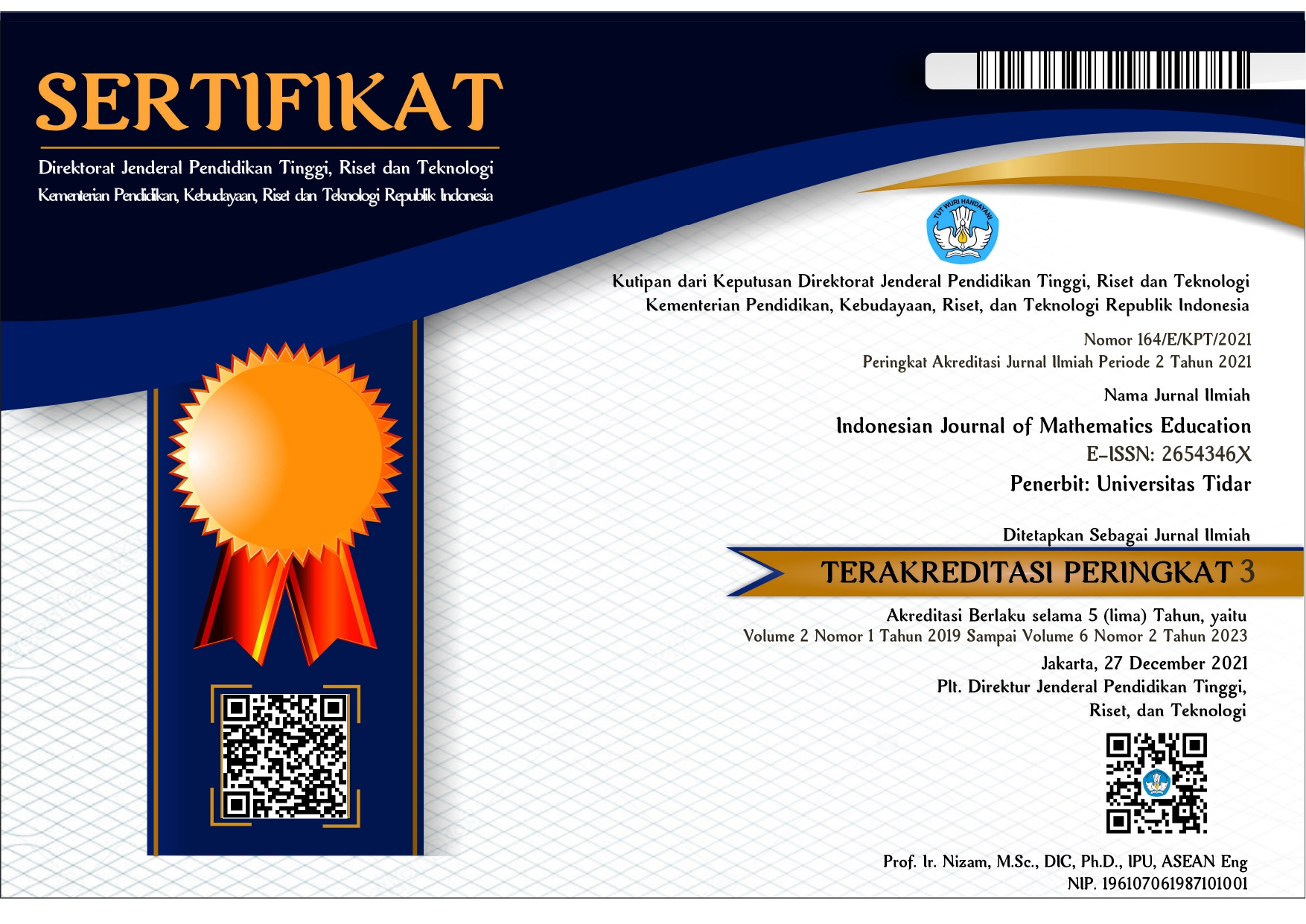Exploring a Mathematics Teacher’s Conceptions of Infinity: The Case of Louise
Abstract
Several papers studied infinity from the difficulties that students and teachers show in developing the concept. For this study, it was considered the analysis of the equality 0.999 … = 1. Mainly, this research aims to show that a mathematics teacher presents erroneous conceptions just like a student; that is, both students and teachers have the same difficulties in the concept of infinity. To this aim, a semi-structured interview was conducted with an in-service mathematics teacher in Tlaxcala, Mexico. The purpose of this research is to exhibit a high school math teacher’s misconceptions about the concept of infinity. In general, misconceptions found here can be divided into four groups: without a clear picture of the concept of infinity, an infinite periodic decimal number cannot be a representation of a finite number, a decreasing infinite sum cannot lead to a finite number and an infinite process is limited in real life is finite and has ended. The results obtained were compared with those already available in references about the difficulties with students and teachers, finding that the results shown here are like those reported in the literature. This highlights the need to overcome the teacher’s conceptions of infinity in future research.
References
Ángeles-Navarro, M., & Pérez-Carreras, P. (2010). A socratic methodological proposal for the study of the equality 0 . 999 . . . = 1. The Teaching of Mathematics, XIII(1), 17–34.
Belmonte, J. L., & Sierra, M. (2011). Modelos intuitivos del infinito y patrones de evolución nivelar. Revista Latinoamericana de Investigación En Matematica Educativa, 14(2), 139–171.
Dubinsky, E., Weller, K., McDonald, M. A., & Brown, A. (2005a). Some historical issues and paradoxes regarding the concept of infinity: An APOS-based analysis: Part 1. Educational Studies in Mathematics, 58(3), 335–359. https://doi.org/10.1007/s10649-005-2531-z
Dubinsky, E., Weller, K., McDonald, M. A., & Brown, A. (2005b). Some historical issues and paradoxes regarding the concept of infinity: An APOS analysis: Part 2. Educational Studies in Mathematics, 60(2), 253–266. https://doi.org/10.1007/s10649-005-0473-0
Edwards, B. (1997). An undergraduate student’s understanding and use of mathematical definitions in real analysis. In J. Dossey, J. O. Swafford, M. Parmentier, & A. E. Dossey (Eds.), Proceedings of the 19th annual meeting of the North American Chapter of the International Group for the Psychology of Mathematics Education (Vol. 1, pp. 17–22). ERIC/CSMEE, The Ohio State University Columbus.
Eisenmann, P. (2008). Why is it not true that 0.999 … < 1? Teaching of Mathematics, 11(1), 35–40.
Hannula, M. S., Pehkonen, E., Maijala, H., & Soro, R. (2006). Levels of students’ understanding on infinity. Teaching Mathematics and Computer Science, 4(2), 317–337. https://doi.org/10.5485/tmcs.2006.0129
Hatch, J. A. (2002). Doing Qualitative Research in Education Settings. State University of New York Press.
Kattou, M., Thanasia, M., Katerina, K., Constantinos, C., & George, P. (2010). Teachers’ Perceptions About Infinity : a Process or an Object ? In V. Durand-Guerrier, S. Soury-Lavergne, & F. Arzarello (Eds.), Proceedings of the 6th Congress of the European Society for Research in Mathematics Education (pp. 1771–1780). www.inrp.fr/editions/cerme6
Manfreda Kolar, V., & Čadež, T. H. (2012). Analysis of factors influencing the understanding of the concept of infinity. Educational Studies in Mathematics, 80(3), 389–412. https://doi.org/10.1007/s10649-011-9357-7
Medina Ibarra, L., Romo-Vázquez, A., & Sánchez Aguilar, M. (2019). Using the work of Jorge Luis Borges to identify and confront students’ misconceptions about infinity. Journal of Mathematics and the Arts, 13(1–2), 48–59. https://doi.org/10.1080/17513472.2018.1504270
Mena-Lorca, A., Mena-Lorca, J., Montoya-Delgadillo, E., Morales, A., & Parraguez, M. (2015). El obstáculo epistemológico del infinito actual: persistencia, resistencia y categorías de análisis. Revista Latinoamericana de Investigación En Matemática Educativa, 18(3), 329–358. https://doi.org/10.12802/relime.13.1832
Monaghan, J. (2001). Young peoples’ ideas of infinity. Educational Studies in Mathematics, 48(2–3), 239–257. https://doi.org/https://doi.org/10.1023/A:1016090925967
Roa-Fuentes, S., & Oktaç, A. (2014). El infinito potencial y actual : descripción de caminos cognitivos para su construcción en un contexto de paradojas. Educación Matemática, 26(1), 73–102. http://www.revista-educacion-matematica.com/revista/2016/05/15/vol26-1-3/
Schwarzenberger, R. L. E., & Tall, D. (1978). Conflicts in the learning of real numbers and limits. Mathematics Teaching, 82, 44–49.
Singer, M., & Voica, C. (2003). Perception of infinity: does it really help in problem solving? In A. Rogerson (Ed.), Proceedings of the International Conference The Decidable and the Undecidable in Mathematics Education (pp. 1–7). http://dipmat.math.unipa.it/~grim/21_project/21_brno_03.htm
Tirosh, D. (2002). The Role of Students’ Intuitions of Infinity in Teaching the Cantorian Theory. In D. Tall (Ed.), Advanced Mathematical Thinking (pp. 199–214). Springer Netherlands. https://doi.org/10.1007/0-306-47203-1_12
Wijeratne, C., & Zazkis, R. (2015). On Painter’s Paradox: Contextual and Mathematical Approaches to Infinity. International Journal of Research in Undergraduate Mathematics Education, 1(2), 163–186. https://doi.org/10.1007/s40753-015-0004-z
Yopp, D. A., Burroughs, E. A., & Lindaman, B. J. (2011). Why it is important for in-service elementary mathematics teachers to understand the equality .999...=1. Journal of Mathematical Behavior, 30(4), 304–318. https://doi.org/10.1016/j.jmathb.2011.07.007
Published
How to Cite
Issue
Section
Copyright (c) 2023 Indonesian Journal of Mathematics Education

This work is licensed under a Creative Commons Attribution-NonCommercial-ShareAlike 4.0 International License.









